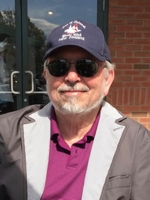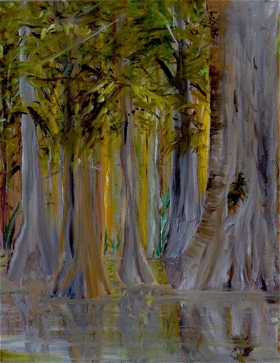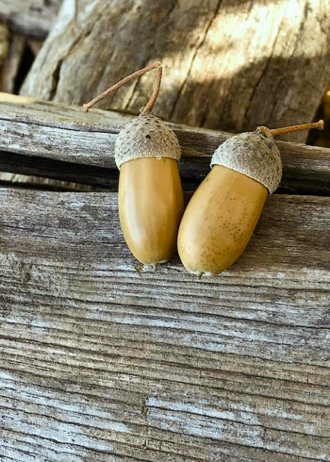Poems by Luke Wallin
Archives: by Issue | by Author Name

Canyon Deep
by Luke Wallin
From Canary Summer 2018
Luke lives in the Sakonnet River watershed basin near the Atlantic Ocean on a stream that flows north.

Painting by Luke Wallin
Up a random switchback road you twist the wheel
try not to glance as
vineyards stretch out gracefully
then disappear.
Little black car of loaner luxury,
let’s go high and
high again,
lift above that
wine and tourist town.
Farms grow ragged, dead cars rust,
from steep inclines the
eucalyptus timber soars.
Late sky blues are fading pink,
fog can move like
animals after rain.
Oversize trucks come roaring down
displaying beards and
gauntlet-throwing stares.
Marijuana’s growing near, silent pit bulls
press the fences bound with razor wire.
You smell landline feuds and shotgun talk.
Then you’re way up, quite alone.
Park along the edge.
The shadow-bottom canyon
sends its warrior trees aloft.
Lord it’s quiet and chilly as the
ridgeline eats the sun.
Mountain lions move softly in the wet.
© Luke Wallin
Ghosts
by Luke Wallin
From Canary Fall 2021

After dark we
shared the glider
on the porch.
I felt your warmth
as stars came out
from haze.
Some distance off
coyotes began to wail.
Banshee entwined.
You sipped brandy.
We discussed strange
moving lights above.
Then they came,
running down our drive,
two silver coyote ghosts.
We hushed as
they floated in the
rising fog.
Your pleasure reminded
me of when I called the
owls from oak silhouettes.
You were frightened,
deliciously.
I was young.
© Luke Wallin
Hunting at the End of Time
by Luke Wallin
From Canary Fall 2020

Cypress Light by Luke Wallin
1952
In the beginning was the woods, and my father, and our first squirrel-hunting journey away from town with its noise and secrets. That fall was dry, the leaves crisp and crunchy, the hickory tops yellow and full. I remember the day transforming nine-year-old me, setting me on the path of hunting, of seeking wild animals in the tall trees, in shady thickets, along cypress and switchcane creeks. These squirrels were nothing like the boring ones in town. Somehow these were mythic, elusive, and presumably delicious. I learned the beauty of the single crack of my father’s .22 rifle across the hush of the afternoon, and of the fox squirrel falling slowly from a great height to land with a thud in the dry lake bed. I remember our long search, the emptiness and guilt, and my father’s words: keep looking, keep looking. I remember the pride of ownership in our land, and the thrill of trespassing 50 yards onto our neighbor’s, to search for the squirrel. In a single afternoon I experienced passages from town to wilderness, and from landlord to poacher.
1957
My partners Dennis and James and I lived for the purity of those woods, where all creatures existed in their life cycles, where massive trees suggested Edenic wilderness, and where God seemed to brood as he might have done in the days of Abraham or Moses.
We loved my blue-green F-100 Ford pickup truck and our mad drives down Old Macon Road, sliding through curves in the gravel, heading for the clean and natural and mysterious and unknown deeps. We were bound for the yellow-antlered bucks, the bobcats quiet as shadows, the marsh lake stirring under the moon with river bounty—bullfrogs and shellcrackers, catfish and gars, cottonmouths and terrapins. We were teenage boys with guns, our heads full of bible stories, our eyes open for whatever creature might appear next. Perhaps it would be a giant rattlesnake coiled on the sandy trail, or a red-eyed whip-poor-will in the glare of a flashlight, or a woodcock diving in the last of dusk, landing in a plum thicket to speak like a confident kazoo. All the living world was equal in revelation. We did a lot of shooting with great joy.
1973
Leaving from my Hoboken basement, I boarded a plane with my Yankee friend Tom, and as we flew south I continued the stream of stories, teaching him to hunt deer. The next day he stood in the morning fog of the Three Buck Woods, listened to a single twig snap, and caught a flash of movement 80 yards away. The buck slipped between cypresses and when his eyes passed behind a swollen trunk Tom raised his rife and placed the crosshairs on the alley beyond the tree. He exhaled and did not breathe as the buck moved into his sight pattern; Tom said he could hear my voice in his head, whispering each step. He killed the deer and the hook was set. Tom would come with me every year after that, leaving the population-exploding world, and traveling toward 1840 and Jeremiah Johnson. We exchanged the valley of ashes for the green breast of the new world.
1987
All year long Tom and I dream of our hunting week. We identify crucial elements of the hunt: camaraderie, thrill of the chase, ritual sacrifice, and communion with nature. Within these categories we place friendship, knowledge of the land and the game, moderation and fair chase, a careful shot, tending the meat, and honoring the slain animal through the cooking and feasting. We field dress our deer, and pack out the meat, bearing its weight on our shoulders like a penance or duty that redeems the taking of life. Buried in all this analysis is the moment of the kill. In our club, we try to subsume the killing itself, contextualize it; but, it is the love that dare not speak its name.
Like my partners from childhood, Tom and I swear we will never hunt anywhere else. My friends and I live all year in interior lives of this hunt, both sleeping and waking dreams of this forest, breathing a cult of hardwood landscape, imagining cavern walls in prehistoric oak, lit by the worship of large antlers.
1990
Hunting has changed. Those who can afford it bulldoze trees and plant row crops of clover and wheat for the deer. At the edge of such fields, plywood boxes preside on stilts, or hang in trees. My woods neighbor has transformed his 2000 acres into a mosaic of plantings and shooting houses.
The farmers have brought ancient hunting into the present time of industrial agriculture. We cling to the old ways, to oak bottoms, to caney sloughs, and to honeysuckled creeks that channel deer. We work hard at our half-conscious historical reenactment, atavistic time travel, creative suspension of disbelief. The farmers’ shots from their shooting houses are long and surgical, felling bucks they can barely see. Our shots are close and exciting.
1996
The wealthy neighbor, obsessed with antlers, organizes people up and down river to cooperate in a Big Buck Program. One can have lots of deer, or deer with impressive antlers. It seems there is not enough food for both. The lord of this manor reserves to himself the largest bucks, taken with a rifle designed for Africa.
2006
The big buck program is working, and now we watch beautiful eight point bucks all the time. These deer would have been trophies in the old days, but we’re letting them pass. There’s so much pleasure in this. Occasionally we take a buck that, to us, seems magnificent. Our neighbor has four months a year to hunt, with his towers, and binoculars, and his illegal bait crops. He knows each deer like his own dog, or his cow. His mounted heads drip extra points like candle wax. Tom says these trophies seem antler pornography. Visit the covers of hunting magazines, and you’ll see.
2009
After a long political struggle, Mississippi has legalized feeding the deer, and the hunters have leapt in. Feeders look like little wooden mangers, with roofs for rain. Owners fill them with corn. They are pouring big money into this to compete with their rivals across the fences, across land lines. Many of them feel they “own every damn deer in the woods,” and they are determined to suck “their” deer across property lines. This makes last year’s nightmare—crops planted as bait—seem almost natural. Those great fields of clover and wheat dedicated to the deer now seem the old lost “normal.”
Deer are hanging around tame and sheep-like, at the feeders of my neighbors. The power of the mating rut, to bring shy monsters out of hiding, to make them careless in chasing the does, has been neutralized. When 30 does are living within 100 yards of a feeder, where you think the bucks will be?
Just as bucks are losing their skills and their wild souls, so are hunters. I watch big-screen TV with a young friend in his cabin and realize his default setting is a hunting channel. His favorite show features a Texas deer ranch. The program highlights enormous antlers of living bucks, shown from shooting towers above the chaparral. After this tease the viewer is presented with special sacks of feed: "18% protein!" This ranch sells the food that nourishes the antlers just outside our cabin.
I try once again to explain our feelings to my friend, but he’s a man who understands his time, and he chuckles. He refers to Tom and me as "buffalo" because we don't adapt! He also says, "The point of feeders is not to kill deer, but to have some deer." I guess he’s right. But I ask myself, when you sit in a shooting house and watch a deer eating from a feeder, what exactly are you doing? Do you want a feedlot buck?
Tom seems on the brink of quitting hunting, after all these decades, though he has agreed to try it "one more season." I’m thinking of adding a single, corrupt, evil, demon feeder in the middle of our big pines, midway between my neighbors. I hope to spread the bucks more evenly, and yet protect our illusion of being Jeremiah Johnson in the trees. Hunting has always meant, from my initiation with my father and that squirrel when I was nine years old, the difference between the corrupt time of town and history, and the time of wilderness. Here I could experience life cycles (the time of ecology), biblical mystery (the time of Abraham), the initial touch of Europeans on American shores (the green breast of the new world), and the time of mountain men (as played by Robert Redford).
But those cultural times are gone. In the presence of feeders those experiences are no longer available to imagination and memory. Nothing has changed, really, in my fifty-plus years of hunting, except that my dreams have been unmasked as dreams. My life of hunting and managing my club has been an exercise in historic preservation, of directing reenactments on a leafy stage.
I just wish we still had wild bucks. I would give anything to go back into the old Three Buck Woods, our 1840, with my friends and hunt again. We hunt, but only in the industrial and televised present, in which we feel acutely the loss of historic presence. We are hunting at the end of time.
Previously published in the Louisville Review.
© Luke Wallin
Shade Life
by Luke Wallin
From Canary Spring 2018

Half a million years ago, we
or something like us
studied sunburnt grasslands
from the safety of our trees.
Shade was refuge; predator panorama
was our prospect, our long view.
Our brains loved the in & out,
the way we raced around & round then
beat the leopard up the tree.
We were born to think most clearly
watching veins of leaves
transferring light, surveiling those who'd
gobble or be gobbled by our family.
Now we pay a premium for hidden perches
with good views. Calming nerves, confirming status,
lookouts give us leave to work out harmonies and
strategies. We listen for the footsteps as we measure
our companion's silence. Unconsciously
we seek a prospect/refuge mate, one to stand the
watch, perhaps, the other to dream adventure.
Asymmetries of green leaf patches, landscape beauty,
secret symbols, whisper of the old fitting, sew our
hearts together in survival song.
© Luke Wallin
This Ocean
by Luke Wallin
From Canary Fall 2020
Now rough sea and storming sky
drive the sunburned families off
Remember when the wind turned cold
and the sand was hot beneath our feet
Long time now since you’ve come down
to watch the seagulls kite the wind
to feel this wide and private sky
this ocean swallowing words

© Luke Wallin
White Oaks
by Luke Wallin
From Canary Fall 2022

Beloved of deer in the frost,
sweet with only a trace of tannin,
long elegant White Oak acorns
lay upon the damp-leaf trail.
Before a squirrel could make his play,
a boy stopped and picked them up.
That night he slept with fingers pressing,
working them in his palm, dreaming.
He saw flooding across the woods,
acres of white beaver sticks floating there,
rafts of acorns trapped in brown water,
catfish having escaped the river
taking those acorns with pops of air, then
flights of Wood Ducks swooping down
claiming the beauties for themselves,
until a bear came splashing through.
The river would plant them as it could,
the trees would slowly claim sunlight
and outcompete the weaker tribes,
until the boy grew old enough to
make a decision, whether he would
be the one to hold an auction,
and if so whether to cut them all,
or spare the ones of a certain diameter.
In that case how many more years
would pass before his forest would rise
once more grand? He would judge his own son’s
hope, to keep the cathedral wild.
If he waited long enough, tornadoes
would come and tear things down.
His son would hunt in the splintered stumps,
in milkweed and honeysuckle weave,
with memories of his younger years, and
those passed down from the old man’s time.
What if the father gave up killing, what if
the son moved away to a city?
What if a young man bought the whole place,
and planted fields, and raised shooting houses,
and laid down rules of who could shoot, and who
could be shot, so that the bucks grew antlers not seen
before, but the bucks went tame, and the hunters, too,
and it fell to the river to spread White Oaks, as it could?
© Luke Wallin